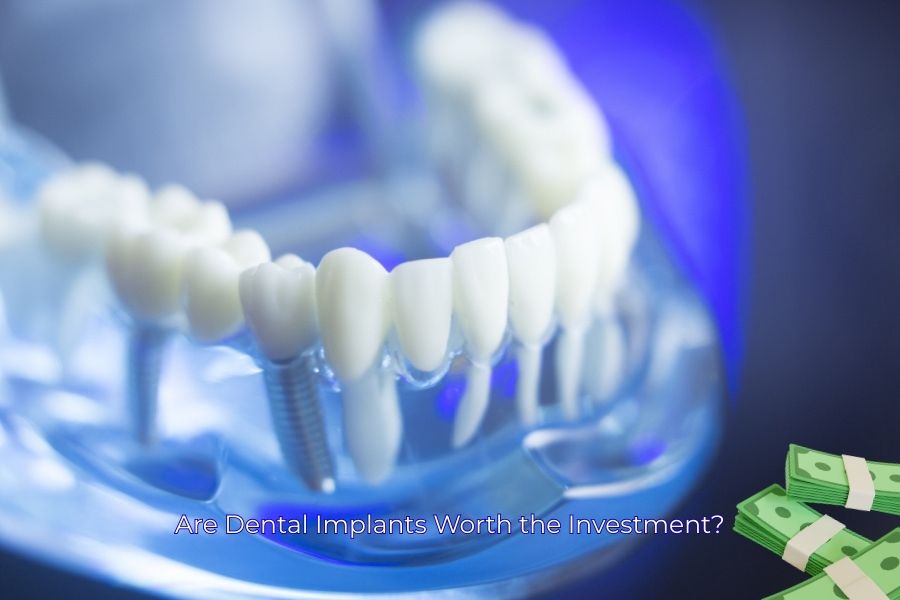
Dental implants are widely regarded as a worthwhile investment, providing a long-term solution for tooth loss that blends function, durability, and natural-looking aesthetics. Thanks to modern dental technology and advanced treatment techniques, implants have become one of the most effective and popular ways to restore missing teeth.
Unlike traditional dentures or bridges, dental implants are surgically anchored into the jawbone, replicating the root of a natural tooth and creating a stable foundation for replacement teeth. But do they justify the cost? Let’s explore the key benefits, expenses, and longevity of dental implants to help you decide if they are the right option for your smile.

Dental implants are small titanium posts that are surgically placed into the jawbone to serve as artificial tooth roots. Over time, the implant fuses with the bone through a natural process called osseointegration, creating a stable and long-lasting foundation for replacement teeth.
Once fully integrated, a crown, bridge, or denture can be securely attached to the implant, restoring both the function and appearance of missing teeth. Unlike removable dentures or traditional bridges, dental implants offer superior stability, enhanced comfort, and a natural-looking smile that can last for many years.
One of the biggest advantages of dental implants is their impressive lifespan. With proper care and maintenance, they can last 20 years or more—and in many cases, even a lifetime. Research shows dental implants have a success rate of up to 98%, making them one of the most reliable tooth replacement options available.
Made from titanium, a biocompatible and corrosion-resistant material, implants are designed for strength and longevity. However, their lifespan can be influenced by factors such as oral hygiene, lifestyle habits, and the overall health of your jawbone. Regular dental check-ups, daily cleaning, and healthy habits can help ensure your implants remain strong and functional for decades.
Dental implants are a higher upfront investment compared to traditional dentures or bridges, but many patients find them to be a more cost-effective long-term solution due to their durability and ability to prevent further dental issues.
Typical dental implant pricing at Ora Dental:
For many patients, interest-free loan options are available to help spread the cost of treatment over time, making dental implants more accessible without financial strain. These flexible payment plans allow you to invest in your smile today while managing monthly repayments comfortably.
While the initial cost may seem high, it’s important to consider the long-term benefits:
When planning for dental implants, you should also account for potential additional costs, such as consultation fees, bone grafts if necessary, and the restoration itself (crown, bridge, or denture).
Ultimately, dental implants combine functionality, aesthetics, and long-term value, making them a worthwhile investment for patients seeking a permanent solution to tooth loss.
Dental implants offer several advantages over traditional dentures, making them a preferred choice for many patients. One of the main benefits is stability. Unlike dentures, which can shift, slip, or require adhesives, implants are securely anchored into the jawbone, providing a reliable fit for eating, speaking, and everyday comfort.
Natural appearance is another key advantage. Implants are custom-made to match the colour, size, and shape of your existing teeth, creating a seamless, natural-looking smile. Dentures, on the other hand, can sometimes appear bulky or less lifelike.
Perhaps most importantly, dental implants help preserve jawbone health. When a tooth is lost, the underlying bone can begin to deteriorate without the stimulation provided by a natural root. Implants mimic this stimulation, maintaining bone density and supporting facial structure. Dentures do not offer this benefit, and long-term denture use can sometimes lead to changes in the shape of the face.
Overall, while dentures can be a temporary or cost-effective solution, dental implants provide a more permanent, functional, and natural-looking option for tooth replacement.
While dental implants provide a long-lasting and effective solution for missing teeth, they may not be suitable for everyone. To support an implant, patients need healthy gums and sufficient jawbone density.
In cases where significant bone loss has occurred, a bone graft may be necessary to create a stable foundation for the implant. This additional procedure can extend the overall treatment time and increase costs.
As with any surgical procedure, dental implants carry some risks, including infection, implant failure, or nerve damage. Fortunately, these complications are uncommon, and dental implants generally have a high success rate. Choosing an experienced and qualified dental surgeon is essential to minimise risks and ensure the best possible outcome.
Dental implants do more than restore the function and appearance of missing teeth—they can have a profound impact on a patient’s quality of life. Being able to eat, speak, and smile with confidence helps many people feel more self-assured and socially comfortable.
Research supports these benefits. A 2016 survey by the American Academy of Implant Dentistry found that 87% of patients were satisfied with their dental implants and experienced increased confidence in social situations, highlighting the positive effect on mental health and overall wellbeing.
Unlike dentures, dental implants require no special care or dietary restrictions. They are maintained just like natural teeth, with regular brushing, flossing, and dental check-ups. This convenience makes implants a low-maintenance, long-term solution that seamlessly integrates into daily life.
For many patients, dental implants are a worthwhile investment thanks to their durability, functionality, and natural appearance. Although the initial cost may be higher than other tooth replacement options, the long-term benefits—improved oral health, increased confidence, and enhanced quality of life—often make implants a more cost-effective choice over time.
With a success rate of around 98% and a lifespan that can exceed 20 years, dental implants provide a reliable, long-lasting solution for restoring missing teeth and maintaining overall oral health. If you’re considering dental implants, consulting a qualified dentist is essential to evaluate your individual needs and determine whether this treatment is the right fit for you.